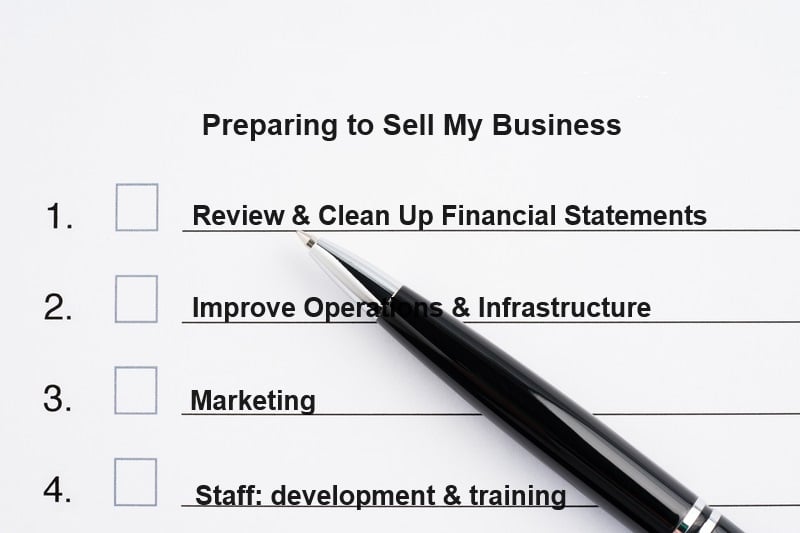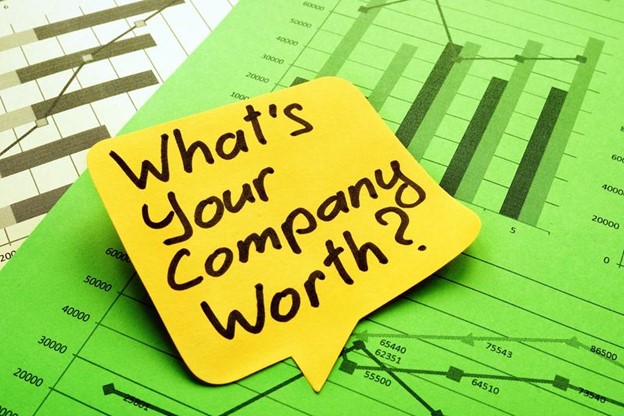Taking steps in advance to prepare your business for sale can increase the value of your company and reduce the time it takes to successfully sell your business. Frequently when business owners decide it’s time to sell their business they have not prepared for the sale and the business has issues that diminish the value and hurt the marketability of the company.
We have outlined 7 important steps that will increase the market value of your business and optimize the marketability of your company. If you are contemplating the sale of your business it is wise to talk to a professional business broker and your CPA in advance to prepare for the sale.
7 Steps to Prepare to Sell Your Business
- Financials, Books & Records:
Financial statements are the scorecard for your business and ultimately determine the value of your business. Your Federal Tax Returns, Profit & Loss Statements (P&L), and Balance Sheet are used to calculate the Discretionary Earnings (DE) which is the total economic benefit the owner derives from their business. The DE is used to value the company based on cash flow and sales multiples from comparable sales.- Meet with your CPA and review your financial statements. Make sure all of your owner benefits and expenses that are run through the company are well documented and are tied to your tax return statements. If the expenses are not documented they cannot be added back as an owner benefit, which reduces your DE (discretionary earnings).
- Meet with a Business Broker to discuss the prospective sale of your business well in advance of putting it on the market. Your Business Broker can review the financials and the operations and give you insights on how to prepare for the sale of the business. Your Business Broker can also do a Market Value Report to give you an idea of the value of our business today.
- Make sure all of your income (sales) is shown on your tax returns. Income such as “cash” sales that are not shown on the company tax returns are not considered in the business value as there is little or no proof of the sales. Note that with retail businesses “cash” sales are sometimes considered, however, these sales are heavily discounted and do not have the same value as reported and well-documented sales. In general, hiding or not reporting income dramatically reduces the value of your business.
- Keep your financials current and have your tax returns filed and ready when you put your business on the market. While your business is on the market you will need up-to-date financial statements and if you are using SBA financing your P&L needs to be updated to within the last 60 days.
- Operations & Infrastructure:
Buyers are looking for a turnkey business they can buy and immediately start running. Thus, having systems and procedures is a big plus. A business that runs well with minimal owner oversight is easier to sell than one where the owner has his hands on every aspect of the day-to-day operations. - Marketing:
If your business has a marketing and sales program in place that’s a big plus, although many small businesses do not. The lack of a formal marketing and sales program is not necessarily a big negative as most buyers are comfortable with this area of running a business and have their own ideas about it. Thus in many cases, a company that has good earnings with a weak marketing campaign or no marketing is seen as a growth opportunity (although I don’t recommend ignoring marketing as it will grow your business and increase earnings and value). - Customer Concentration & Stability:
If your business depends on one or a very few customers for the majority of its income this causes concerns with prospective buyers and SBA lenders. Customers representing more than 20% to 30% of sales will be reviewed carefully for risk of loss. If you have a customer representing over 50% of sales many buyers will consider the risk too high. This doesn’t mean a business with high customer concentration cannot be sold, but it is much more difficult. If you are preparing to sell and have a very high customer concentration diversifying and expanding your customer base is a high priority. - Staff:
A well-trained and capable staff is a key selling point as this reduces the dependency on the owner. This is related to operations and infrastructure, but in this case, we are referring to having key managers, supervisors, and trained staff capable of running day-to-day operations.
If you are a small business with a small staff that’s OK, make sure they are well-trained at handling as much of the day-to-day operations as possible. Delegate as much of the day-to-day work as possible and train the staff to take on as much responsibility as possible. - Work with an Experienced and Professional Business Broker:
Your choice of the business broker to represent you in the sale of your business is equally critical. An experienced business broker can provide a detailed Recast Financial Statement showing the correct Discretionary Earnings, Comparable Sales Reports (selling prices and multiples for similar businesses), and a Market Value Report. Likewise, a professional business broker will prepare a comprehensive Confidential Business Review (marketing prospectus) for your business and market your business on the top business-for-sale websites, in addition to sending email marketing to their internal buyer lists. A professional business broker will be instrumental in your negotiations (getting you the best possible price) and facilitating Due Diligence which is a key step before opening escrow. An experienced business broker professional will also help the buyer obtain SBA financing and guide them through the closing process. - Tax Planning with your CPA and Financial Advisor:
While tax planning doesn’t affect the market value or marketability of your business, it has an enormous impact on how much you will keep from the proceeds. There are a number of things you can do in advance to minimize your taxes and increase the Discretionary Earnings of the company. Since Discretionary Earnings drive the value of a business, increasing DE will directly increase the value of your business and its marketability. Likewise, advanced tax planning with your CPA and financial advisor can dramatically reduce your taxes from the sale of the business. We work with several financial planners that offer tax strategies to defer the taxes from the sale and allow the seller to invest the proceeds.




